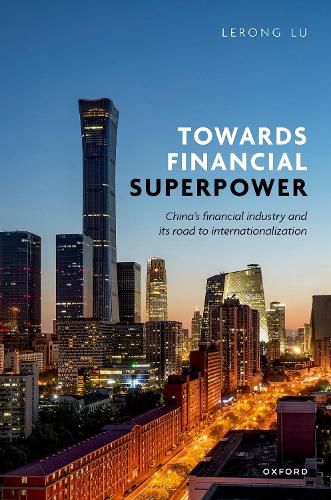Readings Newsletter
Become a Readings Member to make your shopping experience even easier.
Sign in or sign up for free!
You’re not far away from qualifying for FREE standard shipping within Australia
You’ve qualified for FREE standard shipping within Australia
The cart is loading…






The topic of the financial industry, from both practical and regulatory perspectives, has been widely debated since the Global Financial Crisis of 2007-2008, but the discussion is mostly framed within a Western context. However, China now boasts one of the largest and most dynamic financial systems in the world and has three of the largest global stock markets as well as the gigantic commercial banks such as the ICBC and the Bank of China. It is actively opening its financial markets by reforming its securities law and introducing stock connect schemes with exchanges in the UK and Switzerland and also has the most advanced Fintech and mobile payment sector. China's central bank digital currency (CBDC) pilot project is already being rolled out on a national scale, contributing to the rise of the Chinese yuan as a new global currency. In this volume, Lerong Lu explores the remarkable rise of China's financial industry, its detailed operating mechanisms, and regulatory frameworks and regime. He examines the legal and regulatory environments underpinning this industry, including its regulatory agencies and institutional arrangements (such as the People's Bank of China, the National Financial Regulatory Administration, and the China Securities Regulatory Commission), financial safety net and crisis management tools, and specialized financial courts and dispute resolution mechanisms. Lu captures the fast-changing and dynamic nature of China's financial institutions and markets from three unique angles: financial marketization, financial globalization, and financial innovation. Through detailed case studies, the author critically assesses the strengths and special characteristics of these financial institutions, markets, and currencies in the world's second-largest economy, addressing if and when China becomes the next global financial superpower.
$9.00 standard shipping within Australia
FREE standard shipping within Australia for orders over $100.00
Express & International shipping calculated at checkout
The topic of the financial industry, from both practical and regulatory perspectives, has been widely debated since the Global Financial Crisis of 2007-2008, but the discussion is mostly framed within a Western context. However, China now boasts one of the largest and most dynamic financial systems in the world and has three of the largest global stock markets as well as the gigantic commercial banks such as the ICBC and the Bank of China. It is actively opening its financial markets by reforming its securities law and introducing stock connect schemes with exchanges in the UK and Switzerland and also has the most advanced Fintech and mobile payment sector. China's central bank digital currency (CBDC) pilot project is already being rolled out on a national scale, contributing to the rise of the Chinese yuan as a new global currency. In this volume, Lerong Lu explores the remarkable rise of China's financial industry, its detailed operating mechanisms, and regulatory frameworks and regime. He examines the legal and regulatory environments underpinning this industry, including its regulatory agencies and institutional arrangements (such as the People's Bank of China, the National Financial Regulatory Administration, and the China Securities Regulatory Commission), financial safety net and crisis management tools, and specialized financial courts and dispute resolution mechanisms. Lu captures the fast-changing and dynamic nature of China's financial institutions and markets from three unique angles: financial marketization, financial globalization, and financial innovation. Through detailed case studies, the author critically assesses the strengths and special characteristics of these financial institutions, markets, and currencies in the world's second-largest economy, addressing if and when China becomes the next global financial superpower.